
21st February 2025BY Nihang Law
Understanding the Difference Between Separation vs. Divorce: A Guide for Those Facing Relationship Challenges
When a marriage is struggling, it is natural to consider your options. The decision to separate or divorce is never easy, and it comes with significant emotional and legal consequences. Whether you are feeling overwhelmed by uncertainty or simply seeking clarity, understanding the key differences between separation vs. divorce can help you make an informed decision that best suits your circumstances.
What is Separation?
Separation occurs when a married couple decides to live apart but remains legally married. In Ontario, there is no legal requirement to file for separation formally; it happens when one or both spouses choose to live separately with the intention of ending the relationship.
Key Aspects of Legal Separation:
- Legal Separation Agreement: While not mandatory, a legal separation agreement can outline important matters such as child custody, spousal support, and division of property.
- Still Legally Married: Unlike divorce, separation does not end the marriage, meaning neither spouse can remarry unless they obtain a divorce.
- Trial or Permanent Separation: Some couples use separation as a period of reflection before deciding on reconciliation or divorce.
- Religious or Personal Reasons: Some couples remain separated but not divorced due to religious beliefs or financial considerations, such as continued access to spousal benefits.
- Effects on Finances and Property: While separated, spouses may still have financial ties, including joint debts or obligations under family law.
What is Divorce?
Divorce is the legal process that formally ends a marriage. In Ontario, a divorce can only be granted by the court. The most common ground for divorce is living separately for at least one year with no chance of reconciliation. However, divorce can also be granted for reasons such as adultery or cruelty.
Key Aspects of Divorce
- Legal Termination of Marriage: Once a divorce is granted, both individuals are free to remarry.
- Child Custody and Support Orders: The court may issue orders regarding custody, parenting time, child support, and spousal support.
- Division of Property: A divorce usually involves dividing marital assets and debts according to Ontario’s family property laws.
- Finality: Unlike separation, divorce is permanent. Couples who reconcile after divorce would have to remarry if they wish to be legally married again.
- Attorney in Divorce: A qualified lawyer can help guide you through the legal complexities of divorce and ensure your rights are protected.
Separation vs. Divorce: Which One is Right for You?
Choosing between separation vs. divorce depends on individual circumstances. Below are some common situations that can help guide your decision:
Scenario 1: You Need Time and Space to Decide
If you are unsure whether you want to end your marriage permanently, a separation may be the best option. It allows both partners to live apart while taking the time to reflect on their future. During this time, a legal separation agreement can help set clear expectations regarding financial responsibilities and child care.
Scenario 2: You Want to Stay Married for Religious or Financial Reasons
Some couples choose to remain legally married due to religious beliefs that discourage divorce. Others may find that staying married benefits them financially, such as continued health insurance coverage or pension entitlements. In such cases, separation can provide a workable solution.
Scenario 3: There is No Hope for Reconciliation
If the relationship is beyond repair and both parties agree that moving forward separately is the best option, divorce may be the appropriate step. A lawyer for divorce can help you navigate this legal process and ensure a fair outcome.
Scenario 4: You or Your Children Are in a Harmful Situation
If your marriage involves domestic abuse or emotional distress that negatively affects you or your children, seeking a divorce might be the best course of action to ensure safety and stability. An attorney in divorce can help you file the necessary legal paperwork and secure protective measures if required.
Scenario 5: You Want to Remarry in the Future
If you see yourself remarrying, a divorce is necessary, as separation alone does not end your marriage in the eyes of the law.
Final Thoughts: Making the Right Decision for Your Future
Deciding between separation vs. divorce is deeply personal and can be emotionally challenging. Whether you choose to separate or file for divorce, it is important to seek legal advice to understand your rights and obligations.
If you are struggling with this decision, you are not alone. Many people face this crossroads, and there are resources available to help you navigate this difficult time. Speaking to a family law lawyer in Toronto, Ontario can provide clarity and reassurance, ensuring that you make the best decision for yourself and your family.
Need Legal Advice? Contact Nihang Law Today
If you are considering separation vs. divorce and need professional guidance, Nihang Law’s experienced family law team are here to help. We understand the complexities of family law and will work with you to find the best solution for your unique situation.
Call us today at (416) 321-0353 for a confidential consultation and take the first step toward a clearer future.
Thank you for reading this post, don't forget to subscribe!



